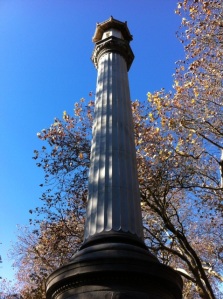Yesterday on November 11, my husband took the girls to a Remembrance Day ceremony held at the Japanese Canadian War Memorial in Stanley Park. Justin’s great-grandfather’s name is upon the cenotaph and the ceremony they attend commemorates the sacrifices Japanese-Canadians made for their country. I always find this interesting in light of the fact that these men and their descendants were treated as foreigners and enemies in the next war and interned in prison camps. But that’s another post. It’s interesting to note, however, that in 1916 volunteers were not accepted in British Columbia, so they travelled to Alberta in order to enlist.

Justin’s great grandfather Masahiro Shishido. I was describing the Kaiser’s mustache to the girls and here Grandpa shows us how it’s done.
When I ask the girls what Remembrance Day is all about, they parrot, “To remember the soldiers who served their country in war,” which is what they’re told at school. When I ask, For which war was Remembrance Day created in 1931? they’re not sure. They’ve heard of Hitler but that’s about it. They know I like history so they begin asking for a complete rundown of World War I and World War II – over breakfast. I’m not equipped to deliver a history lecture but I did my best with the little I know. I am in the process of learning about World War I, which is further back in history and therefore harder to grasp and understand. I have a whole list of books I’m working on, although the best starting place has been Ken Follett’s recent history trilogy that begins with Fall of Giants and World War I. Winter of the World deals with World War II and the third one, Edge of Eternity, is about the 1960s and the changes of that era. Ken Follett has a great way of giving immediacy to history and is one of the best authors for providing a coherent framework on which to hang further research.
My plan is to try to teach the girls a bit of history at a time and to try to bring that sense of immediacy to them. I think it’s important that World War I was the first mechanized war. Men from farms and villages who had never seen machinery were now overwhelmed with technology. People who had never heard so much as a firecracker were stunned by colossal explosions. Horses were used in the war, which seems incredible now. Shell-shock was the old term for PTSD or Post Traumatic Stress Disorder, only of course in the 1910s people didn’t understand what the soldiers had truly endured, unless they’d been there themselves. There are so many things to learn about this war and it spread out in all directions. I’m actually feeling that I should learn more about the Crimean War to get more background on World War I! It never ends, does it?
I think that books and movies are the places to start. Steven Spielberg’s War Horse is good, as is Passchaendale. Legends of the Fall is on my list and also possibly Gallipolli, although World War I in the Middle East is an entire category on its own.
For books, Charles Todd’s series about a Scotland Yard detective who is a veteran of World War I is well done, as is Jacqueline Winspear’s Maisie Dobbs series. I remember reading All Quiet on the Western Front in high school and not understanding a bit of it because there was no context. None of us had any clue about the history of the novel. I should reread that.
For nonfiction, on my list I have Margaret MacMillan’s The War that Ended Peace, Christopher Clark’s Sleepwalkers: How Europe Went to War in 1914, A World Undone by G.J. Meyer (I love this author), and Lawrence in Arabia by Scott Anderson. But there is a whole slew of nonfiction books on the subject so – lots of reading to do.
I think for the kids, perhaps the best introduction might be Rilla of Ingleside, one of the last books in L.M. Montgomery’s Anne of Green Gables series. They absolutely loved Anne of Green Gables and we will continue the series although I’m waiting for them to get a bit older. In Rilla, war touches Anne’s family with tragedy. It’s the saddest Anne book and L.M. Montgomery’s books are full of tragedy so that’s saying something.
I’m also considering an introduction to World War I poets. Every single school Remembrance Day ceremony features John McCrae’s In Flanders Field, which is beautiful, but I take mild exception to the third verse which exhorts the living to continue the war, to “take up our quarrel with the foe.” The poem was so popular it was used as war propaganda to whip up support. I prefer Siegfried Sassoon, who used poetry to express his disillusionment with those who perpetuated a jingoistic and useless war. His poems powerfully convey an enormous grief and bitterness. No pro-war propaganda here; Sassoon was seriously angry and you get a very sharp sense of that in his poetry.
I am aware that Remembrance Day is a day we keep aside to honour those who felt it was their duty to try to protect other people, regardless of which specific war they served in. I also feel that it our responsibility to take the time to consider those who volunteer to be prepared to protect us and our system of belief. And of course we think about the lives of those who sacrificed themselves in the service of their country. But I tend to think most about the First World War, the war that shocked the world and changed us forever.


You must be logged in to post a comment.